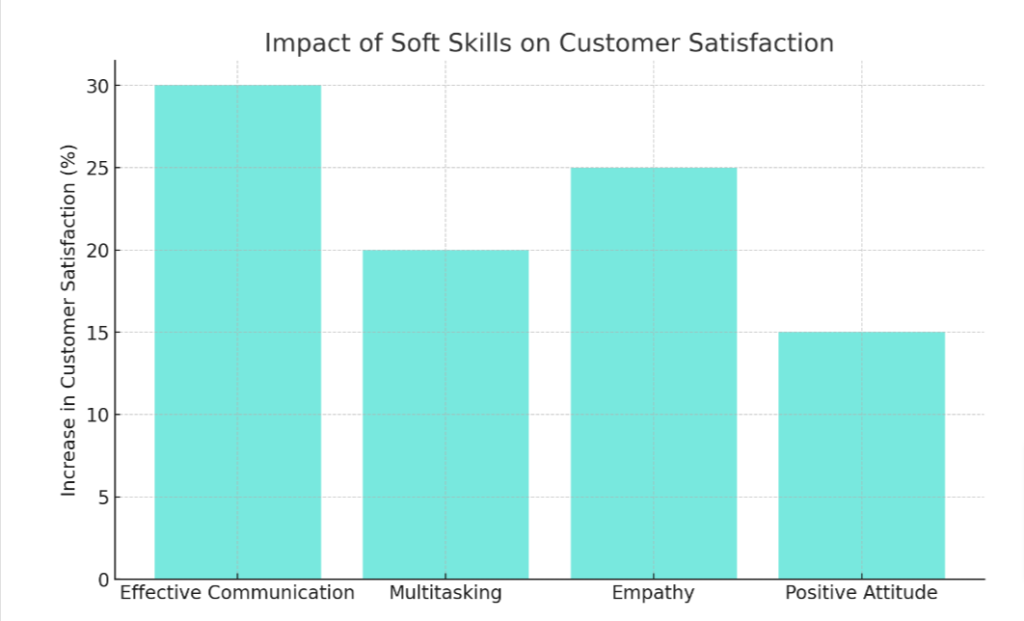Enhancing Customer Interactions: Key Soft Skills for Live Chat Experts
In the fast-paced world of online customer service, live chat professionals face unique challenges daily. Studies show that 73% of customers find live chat to be the most satisfying way of communicating with a business.
This blog will guide you through honing the essential soft skills needed to excel in this role and keep your customers happy. Don’t miss these tips—read on!
Key Takeaways
- Live chat professionals must excel in written communication, as they rely solely on text to solve customer problems without the aid of vocal tone or body language.
- Effective multitasking abilities are critical for managing several chats at once; agents need to respond quickly and prioritize issues efficiently.
- Showing empathy is key in live chat support; understanding customer feelings and experiences helps resolve conflicts and builds trust.
- Maintaining a positive mindset is not only essential for interacting with customers but also benefits workplace morale and productivity.
- Continuous training, seeking feedback, participating in job assessments, and adapting to new challenges help improve the soft skills necessary for top-notch live chat service.
What Are Soft Skills?
Soft skills are essential interpersonal abilities that enable live chat professionals to effectively communicate, multitask, show empathy, and maintain a positive attitude while assisting customers.
These skills are crucial for providing exceptional customer service through online chat support.
Communication skills
Good communication skills are at the heart of effective live chat support. Live chat agents need to be clear and concise, providing answers that help customers without causing confusion or frustration.
They must master the art of written communication since they won’t have vocal tone or body language to rely on. Quick typing skills become essential too because customers expect fast responses.
Excellent communicators also know how to actively listen even in a text-based environment. This means understanding customer concerns fully before responding. Interpersonal skills like empathy and problemsolving come into play here, allowing agents to connect with customers and navigate through issues effectively.
It’s this blend of responsiveness, clarity, and connection that can transform a simple chat into a standout customer service experience.
Multitasking abilities
Multitasking skills are crucial for live chat agents who often juggle several conversations at once. These professionals must switch seamlessly between chats without dropping the ball on customer service quality.
They need to type quickly, keep track of multiple issues and solutions, and maintain a consistent tone across all interactions. Good multitasking also involves prioritizing tasks effectively, ensuring that urgent customer needs receive immediate attention while less critical matters are queued appropriately.
Live chat support requires an ability to handle simultaneous demands with speed and accuracy. To excel in this environment, agents must develop strong problemsolving skills alongside their multitasking abilities.
This helps them respond swiftly to inquiries while managing the flow of conversation efficiently. Next up: why empathy is key in customer interactions.
Empathy
Empathy stands at the heart of customer service. Live chat agents who show understanding and compassion can quickly connect with customers on a personal level. They listen attentively to concerns and respond with care, demonstrating that they value the customer’s feelings and experiences.
This skill is vital for resolving conflicts and building trust. Live chat professionals must balance empathy with effective problemsolving tactics. They should strive not only to acknowledge a customer’s emotions but also to offer tangible solutions promptly.
Recognizing each customer as an individual with unique needs helps turn challenging interactions into positive outcomes, thereby enhancing overall satisfaction. Carrying this perspective forward, maintaining a positive attitude becomes equally essential in delivering exceptional service.
Positive attitude
Live chat professionals must maintain a positive attitude, even in challenging situations. This means staying optimistic and friendly when handling customer queries or complaints. A positive demeanor can help create a pleasant experience for customers, contributing to their overall satisfaction with the service.
Maintaining a positive attitude also boosts team morale and productivity, fostering a more collaborative work environment. Live chat agents with a positive mindset are better equipped to handle stress and pressure while effectively managing various tasks simultaneously.

Top Soft Skills Needed for Live Chat Professionals
Subject-matter expertise, writing skills, time management, customer feedback, and adaptability are some of the top soft skills required for live chat professionals. Read more about how to develop these essential skills in our blog!
Subject-matter expertise
For live chat professionals, subject-matter expertise is crucial for providing accurate and reliable information to customers. Having a deep understanding of the products or services being offered allows chat agents to swiftly address queries and offer effective solutions.
This expertise can also instill confidence in customers, leading to higher satisfaction levels and increased trust in the company’s support team.
Furthermore, subject-matter expertise empowers live chat professionals to handle complex inquiries with ease, fostering a positive customer experience. By staying knowledgeable about industry trends and updates, chat agents can stay ahead of the curve and provide valuable insights that meet the needs of customers.
Writing skills
When it comes to engaging in live chat support, impeccable writing skills are essential. Live chat agents need to communicate clearly and effectively through the written word to ensure customer issues are resolved promptly and accurately.
This requires strong typing ability, grammar proficiency, and the capability to convey complex information concisely.
Live chat professionals with exceptional writing skills can craft responses that are not only informative but also empathetic. By mastering this soft skill, they can build rapport and trust with customers, leading to positive experiences and increased satisfaction levels.
Time management
Live chat professionals need strong time management skills to handle multiple customer inquiries efficiently. They should prioritize tasks, set realistic response times, and utilize tools that help streamline communication processes.
Effective time management enables agents to stay organized, provide timely assistance, and maintain productivity in a fast-paced environment.
Proficient time management empowers live chat professionals to address customer needs promptly while handling concurrent conversations. It allows for better focus on each interaction without compromising the quality of service provided.
Customer feedback
To complement effective time management, live chat professionals should actively seek and utilize customer feedback. By encouraging customers to share their experience, agents can gain valuable insights into areas for improvement in communication, problem-solving, and empathy skills.
Incorporating this feedback into ongoing training programs allows support agents to continuously enhance their soft skills while meeting the evolving needs of customers.
Utilizing customer feedback is vital for enhancing soft skills such as active listening and conflict resolution. Analyzing customer interactions provides invaluable information on where improvements are needed across all touchpoints with clients.
Adaptability
Live chat professionals need to demonstrate adaptability by quickly adjusting to new situations and challenges that may arise during customer interactions. As the customers’ needs vary, it’s essential for agents to be flexible in their approach to problem-solving, communication, and providing relevant solutions.
Adapting to different customer personalities and demands ensures a tailored and effective resolution is delivered promptly.
Agents with strong adaptability skills can easily transition between various support tasks while maintaining a high level of service quality. This flexibility enables them to handle fluctuating chat volumes, swiftly switch between inquiries, and pivot their approach when dealing with diverse or complex issues.
How to Develop Soft Skills for Live Chat Professionals
Encourage live chat professionals to develop their soft skills through ongoing training, seeking feedback, and participating in job tryouts or assessments. Want to learn more about how to improve your communication, multitasking, and customer service skills? Keep reading!
Training and onboarding
Soft skills training for live chat professionals typically includes sessions on effective communication, problem-solving techniques, and empathetic customer interactions. Onboarding programs are crucial for familiarizing new agents with the company’s culture, tools, and processes.
These initiatives ensure that live chat agents can seamlessly integrate into their roles and provide exceptional customer service from day one.
New hires undergo comprehensive soft skills development during onboarding to equip them with the essential abilities needed in their daily interactions with customers. Training modules cover various aspects of chat support, including typing speed, multitasking skills, problem-solving approaches, empathy techniques as well as industry-specific expertise to handle diverse customer queries effectively.
Feedback and self-reflection
To develop soft skills for live chat professionals, feedback and self-reflection are crucial. Feedback provides valuable insights into strengths and areas that need improvement, helping chat agents enhance their communication and problem-solving abilities.
Self-reflection allows agents to assess their performance, recognize patterns in customer interactions, and identify opportunities for personal growth. By actively seeking feedback and reflecting on their actions, live chat professionals can continuously refine their soft skills to deliver exceptional customer service.
By incorporating feedback from supervisors and customers, as well as engaging in regular self-assessment, live chat professionals can adapt to evolving customer needs while honing their soft skillset.
Job tryouts and assessments
Live chat professionals can showcase their soft skills through job tryouts and assessments. These activities provide an opportunity for candidates to demonstrate their communication, multitasking, and problem-solving abilities in a simulated environment.
Employers can use these tryouts to evaluate how well candidates handle live chat scenarios, manage customer inquiries, and navigate various software tools effectively. By participating in job tryouts and assessments, live chat professionals can exhibit their empathy skills by handling diverse customer situations with care and understanding.
Furthermore, these activities enable employers to assess a candidate’s industry expertise, typing speed, adaptability to different customer service platforms, and overall performance under pressure.
They also offer valuable insights into the candidate’s written communication skills when responding to customer queries promptly and accurately. Overall, job tryouts and assessments play a crucial role in identifying top-notch live chat agents who possess the essential soft skills required for exceptional customer support.
Conclusion
Incorporating soft skills development is crucial for live chat professionals. Enhancing communication and multitasking abilities, along with empathy and a positive attitude, is essential to provide exceptional customer service.
By focusing on subject-matter expertise, writing skills, time management, and adaptability, live chat agents can improve their performance and satisfaction levels of customers. Training, feedback loops, self-reflection opportunities, as well as job tryouts will effectively cultivate these vital soft skills in live chat professionals.

